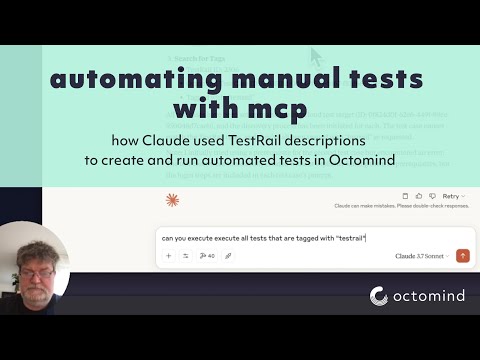The octomind-mcp server enables developers to integrate Octomind's end-to-end (e2e) testing platform into their local development environment for creating, executing, and managing automated tests.
Key capabilities include:
Search Documentation: Query Octomind's documentation
Test Management: Create, retrieve, and execute test cases
Environment Control: List, create, update, or delete test environments
Test Reporting: Access test execution reports
Test Target Administration: Create, update, or delete test targets (projects/applications)
Private Locations: Configure testing behind firewalls or VPNs
Server Configuration: Get server version, configure session storage (in-memory/Redis), and adjust logging settings
Integration Support: Provides configuration examples for various clients
Click on "Install Server".
Wait a few minutes for the server to deploy. Once ready, it will show a "Started" state.
In the chat, type
@followed by the MCP server name and your instructions, e.g., "@octomind-mcpexecute tests for our checkout flow on staging"
That's it! The server will respond to your query, and you can continue using it as needed.
Here is a step-by-step guide with screenshots.
octomind mcp server: let agents create and manage e2e tests
Octomind provides a whole e2e platform for test creation, execution and management including auto-fix. With this MCP server you can use Octomind tools and resources in your local development environment and enable it to create new e2e tests, execute them and more. see https://octomind.dev/ and https://octomind.dev/docs/mcp/install-octomind-mcp for more details.
See it in action together with testrail mcp

Related MCP server: eClass MCP Server
Configuration
Environment Variables
The server uses the following environment variables:
APIKEY- The API key for Octomind API (required)OCTOMIND_API_URL- Base URL for the API endpoint to use (defaults to https://app.octomind.dev/api)REDIS_URL- Redis connection URL for session storage (optional, format: redis://host:port)SESSION_EXPIRATION_SECONDS- Time in seconds after which sessions expire (optional, Redis only)
Command Line Options
The server supports the following command line options:
-s, --sse- Enable SSE transport mode-t, --stream- Enable Streamable HTTP transport mode-c, --clients- Show client configuration examples-p, --port <port>- Port to listen on (default: 3000)-r, --redis-url <url>- Redis URL for session storage-e, --session-expiration <seconds>- Session expiration time in seconds
Session Storage
The server supports two types of session storage:
In-memory storage (default) - Sessions are stored in memory and will be lost when the server restarts
Redis storage - Sessions are stored in Redis and can persist across server restarts
For production deployments, it's recommended to use Redis storage with an appropriate session expiration time. The Redis storage option also enables horizontal scaling with multiple server instances.
Logging Configuration
LOG_FILENAME- The file to write logs to (only for debugging). If not set, logging is disabledLOG_LEVEL- The log level to use (defaults to info)
Tools
The following tools are implemented in this MCP server:
search- Search the Octomind documentation for a given querygetTestCase- Retrieve a test case for a given test target and test case IDexecuteTests- Trigger test execution for a given test target on a specified URLgetEnvironments- List environments for a test targetcreateEnvironment- Create a new environment for a test targetupdateEnvironment- Update an existing environmentdeleteEnvironment- Delete an environmentgetTestReports- Retrieve test reports for a test targetgetTestReport- Get a specific test report by IDdiscovery- Create a test case with a description or promptgetPrivateLocations- List all private locations configured for the organizationgetVersion- Get the current version of the Octomind MCP server
Installation
You can get configuration snippets for different clients by running:
This will output configuration examples for Claude Desktop, Cursor, and Windsurf. Here are the configuration files for most clients:
Installing via Smithery
To install octomind-mcp for Claude Desktop automatically via Smithery:
Claude Desktop (.claude-config.json)
Cursor (cursor.json)
Windsurf (mcp_config.json)
Note: Replace your-api-key-here with your actual API key.
To get an APIKEY see here https://octomind.dev/docs/get-started/execution-without-ci#create-an-api-key
Listings / Integrations
Certified by MCPHub